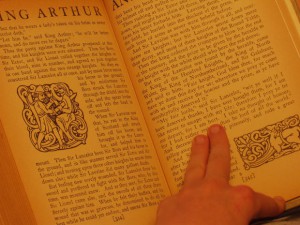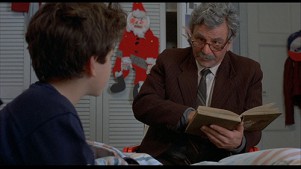

Month: December 2013
Welcome to the Busybird blog, where you can find helpful articles, updates, industry news and more. Make sure you stay up to date by signing up to our newsletter below.
Reading: Part 2
December 19, 2013Reading as Recreation
- ‘When I was your age, television was called books.’
– Grandpa
The Princess Bride.
I’ve never understood people who don’t read. From as early as I can remember, I had a book of some sort in my hand – as a kid, they might be comics; then stuff like the various adventures of Asterix & Obelix, or Tintin; then novels.
There’s a relationship that you get from a book that you just don’t get from any other form of storytelling entertainment. That’s not to invalidate those other forms. There’s always great television series playing. Tune in and you devote yourself to them. It’s not unusual to discuss what happened with friends or family. When we’ve been impressed, how many times have you prefixed a question with, ‘Did you see …?’ or we debate the actions the characters took or what might occur next. If it’s something terrible, we’ll deconstruct it.
It’s the same thing with movies or theater. We’ll sit in a cinema or theater, amongst strangers, and share the experience. If it’s particularly good, we might chorus with laughter or shrieks or sit tensely. If it’s horrible, we might groan or – the more audacious amongst us – might mock it loudly. Afterward, we’ll go through the same examination of the stories and characters.
One of the strengths of these mediums is that they’re very visually and aurally-oriented – particularly in contemporary film and television. There’s very little filmmakers can’t do with CGI, creating worlds and effects that would’ve been impossible just ten years ago. Aurally, both are about more than sound effects (impressive in their own right), but also about the scores.
Watch any film John Williams has scored – e.g. Jaws, Star Wars, ET, Superman, Raiders of the Lost Ark, amongst others – and listen to how the music sometimes not only adds a new dimension to what you’re seeing, but breathes life into it. Many of the people responsible for the early cuts of Star Wars (including George Lucas himself) felt the movie was flat. When John Williams’s score was added, the movie came alive.
Another example is Alfred Hitchcock’s Psycho. Hitchcock originally wanted the famous shower scene to occur without any musical backing. Composer Bernard Herrmann scored it anyway. Hitchcock was furious, but when he heard the score – that tune that’s become so iconic – he changed his mind (and would later pay Herrmann twice his fee as a bonus for the overall score). Could you imagine that shower scene without it?
But there are things that can go wrong in television and movies and plays, as well as all their derivatives (musicals, webisodes, etc.). As with books, the story itself can be lacking, the pacing can be odd, the plotting could be uneven, it could be haphazardly told, and so on. Specific to these mediums, actors might be miscast (e.g. Bonfire of the Vanities), performances could be bad, effects might be laughable, etc.
Books themselves aren’t infallible. Just as we might’ve seen bad television or films, we’ve all read bad books, or books which haven’t resonated with us, (even if they’re regarded as classics). But – for mine – their strength has been the intimate relationship they create with you as a reader. It’s a marriage of you and the book. The words are a framework for your imagination to fill in the details. From there, you are immersed in the book’s world – a world that might be impossible to realise through any other medium.
Similarly with the story itself. Books can span millennia. Characters can begin as babies and we can witness their whole lives unfold before our eyes. Stories can be told disjointedly. There’s nothing a book can’t do, their only parameters the author’s imagination. Whilst film and television can do some astonishing things, there are – and probably always will be – limitations.
Then it’s just you and the story. Even the author themselves can become anonymous at this point, or only be represented through their voice. A bad book can help you even the legs on that uneven table. A good book takes you away until there’s nothing but yourself in this unfolding world. You are a disembodied spectator, becoming more and more invested until, with regret, you have to leave the story. Ever read a book and rued the pages are running out? Not a lot of other forms of entertainment can generate that sort of lament.
The best thing is you can take a book just about anywhere and dip into it anytime – read it on a train, in the tub, on the toilet, waiting for a doctor’s appointment, or whatever the case might be.
Reading’s something you can always do. And there’s always a new story waiting.
LZ.
Reading: Part 1
December 13, 2013Reading for Writers
 There are various reasons why reading is a worthwhile recreation, particularly if you’re a writer. Reading complements the very act of writing as an educator of how to develop your craft. Don’t think you can be a writer without reading. If you think that, you’re deluding yourself.
There are various reasons why reading is a worthwhile recreation, particularly if you’re a writer. Reading complements the very act of writing as an educator of how to develop your craft. Don’t think you can be a writer without reading. If you think that, you’re deluding yourself.
If you’re a writer, here are some reasons why you should be reading …
It teaches us punctuation
Well, how boring is that? But it does. I picked up pretty much all my knowledge of punctuation from reading. When I studied, I was taught only two additional things, (that a full stop goes inside a sentence self-contained within parentheticals, and the use of semicolons in lists containing commas). Everything else I picked up through reading over the years. It mightn’t seem important to some. Why should it? Get published, and some nifty, anonymous editor will put all the damn full stops in place. But a knowledge of punctuation helps you to understand how words can work, and how punctuation (and its use, and placement) can affect the tone of sentences.
It teaches us how sentences are put together
You might protest you know how to put sentences together and you probably do – at least in your own style. But give the same assignment to five different writers, and they’re all going to execute it differently. Some might use short, punchy sentences. Others might have a lyricism to their words. Some might be languorous, developing mood and setting. There’s no limit to the alternatives and it’s instructive to see how different writers construct their prose.
It teaches us about characterisation/setting and description
How do you describe characters? Do you perform an information dump, unloading paragraphs of descriptions once a character is introduced? Or do you seed in the information gradually? Are your descriptions straightforward? Or do you use similes? With a character’s history, do you digress to relay their backstory and how they got to this point in the story? Or do you offer it piecemeal, or trigger it only when the character has some correlation to that bit of history, e.g. when your character picks up a picture from the mantel?
How about setting? Do you handle that similarly to characters? Are their sprawling, Tolkienesque descriptions? Or are they short and sweet? Do you find neat little twists on how to describe things, like Cormac McCarthy? Or are their rich but evocative little details, like Inga Simpson? Look at how different authors describe characters and settings and think about how you do it.
It teaches us about structure
Are your stories purely chronological? Do you intersperse them with intermissions, like Stephen King’s IT? Does you story run in reverse, as occurs with Martin Amis’s Time’s Arrow, where the lead character gets younger and younger as the novel progresses? Is the chronology disjointed, like Kurt Vonnegut’s Slaughterhouse Five? These are just a handful of examples, but there is no limit to the way a story can be presented.
It teaches us about pacing, plotting, and sub-plotting
This might seem silly, but it’s interesting to see the way different authors handle the pacing of their books. In Julian Barnes’s The Sense of Ending, the first half of the book is dedicated to protagonist Tony Webster when he is in secondary school. In the space of a couple of pages, Barnes advances the protagonist to the point of a retiree, and the second half of a book is spent with the protagonist trying to puzzle out a mystery regarding one of his schoolmates. JD Salinger’s The Catcher in the Rye all takes place over several days. Tim Winton’s Cloudstreet unfolds over decades. How do you deal with time?
What about plot? Do you have a proclivity to axis the story around one plot, with all the characters revolving around it? Or are their subplots unrelated to the main plot? All the characters in The Sense of Ending exist to serve the protagonist. In The Catcher of the Rye, everything revolves around Holden Caufield. But take something like JRR Tolkien’s The Lord of the Rings, and whilst ultimately every character is dedicated in the fight against Sauron, they all have their own arcs – Frodo and Sam are attempting to destroy the Ring, Merry serves King Theoden, Pippin serves Lord Denethor, Aragorn is attempting to become a king … and that’s just a smattering of what occurs. In George Martin’s Game of Thrones series, there are numerous characters whose threads evolve disparately.
These examples could go on, and it might seem all that’s happening is a listing of techniques that can be drawn from other books. But this is the point: reading can teach you some amazing things. You don’t have to dissect a book, or analyse how it’s constructed. Just through reading we absorb that information.
Sitting down and writing and writing and writing is a great educator in itself. We hone our skills and get to experiment, find out what works for us and what doesn’t, where our strengths lay and where they don’t, et al, but through reading, we open our minds to possibilities we might not have otherwise considered.
And it can be a lot of fun, too. But more on that next week.
LZ.
Handling Criticism
December 5, 2013 If you’re going to be a writer, here is something you need to learn – and accept – very quickly: not everybody is going to love what you write.
If you’re going to be a writer, here is something you need to learn – and accept – very quickly: not everybody is going to love what you write.
You could spend hours, days, weeks, working on a story, you may consider it pristine, friends and family might tell you it’s brilliant, your workshopping group may praise you effusively, but that doesn’t guarantee that once it’s out in the world it’s going to be accepted or, if it’s accepted and published, that everybody will like it.
In any sort of artistic endeavour – e.g. writing, music, storytelling – we are all at the whim of subjectivity. We see this everywhere. Avatar is the highest-grossing movie of all time, which validates its popularity, but not everybody likes it. Everybody bemoans the success of Fifty Shades of Grey and the Twilight saga, many question the quality of their writing, but there are people who love these books. People loathe the talent on a TV show like The Voice, whilst others love the music.
Subjectivity is also something we experience firsthand in running [untitled]. There are stories we reject and mightn’t think enough of which we later see popping up in another journal, or placing in a short story competition. Conversely, I’m sure we’ve accepted stories that have been unsuccessful elsewhere. This would be the case with other journals, agents, and even publishers.
Everybody has different tastes.
As we go through our writing lives, we have to learn to divorce ourselves from any destructive opinions, especially if we are (and most of us are to some extent, when it comes to our work) sensitive to criticism. There could be ten opinions of our story, nine of them glowing, and we’ll focus on the one which isn’t and let that gnaw at us.
Writing’s difficult. It’s not easy to sit in front of a blank page or blank screen and conjure an entire story from nothing. Talk to any wag at a party and tell them you’re a writer, and they’ll usually regale you with how they’d like to write a book, as if the act of writing simply required spewing any words and ideas onto a page, oblivious to the need for plotting, characterisation, motivation, structure, finding the right words, the right sentences, the right flow, the right evolution, et al.
Submitting’s little easier. Many writers are apprehensive about putting their work out there, worried that rejection will lead to invalidation. For those who do submit, they’ll lead a thankless existence waiting for journals (or publishers or agents) to respond, trying one after another until finally breaking through with an acceptance, (although acceptances usually remain the exception, rather than the rule).
Many – or at least many others who don’t understand a writer’s need to write – will question why writers do it. There’s (usually) little remuneration, less acknowledgement, and the most gratification we do get is from the accomplishment of completing a story and believing (or perhaps hoping) that it works. Because of the subjectivity of art, whether it works (and whether the story is itself complete) is harder to define than the product of, for example, a cabinetmaker, or a car-manufacturer, or whatever the case might be, as their goals have set parameters that have to be met, whereas storytelling is an abstract thing – no two people would tell the same story the same way.
Time and effort aside, we put a lot of ourselves in our writing. And whether our stories are brilliant or not, whether they’re accepted or not, whether they’re loved or not, we should be proud of that.
So don’t take criticism to heart.
LZ.

